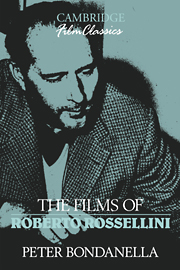Book contents
- Frontmatter
- Contents
- List of Illustrations
- Preface
- 1 Rossellini and Realism: The Trajectory of a Career
- 2 L'uomo dalla croce: Rossellini and Fascist Cinema
- 3 Roma città aperta and the Birth of Italian Neorealism
- 4 Paisà and the Rejection of Traditional Narrative Cinema
- 5 La macchina ammazzacattivi: Doubts about the Movie Camera as a Morally Redemptive Force
- 6 Viaggio in Italia: Ingrid Bergman and a New Cinema of Psychological Introspection
- 7 Il generale Della Rovere: Commercial Success and a Reconsideration of Neorealism
- 8 La prise de pouvoir par Louis XIV: Toward a Didactic Cinema for Television
- Notes
- Chronology
- Filmography
- Bibliography
- Index
4 - Paisà and the Rejection of Traditional Narrative Cinema
Published online by Cambridge University Press: 12 January 2010
- Frontmatter
- Contents
- List of Illustrations
- Preface
- 1 Rossellini and Realism: The Trajectory of a Career
- 2 L'uomo dalla croce: Rossellini and Fascist Cinema
- 3 Roma città aperta and the Birth of Italian Neorealism
- 4 Paisà and the Rejection of Traditional Narrative Cinema
- 5 La macchina ammazzacattivi: Doubts about the Movie Camera as a Morally Redemptive Force
- 6 Viaggio in Italia: Ingrid Bergman and a New Cinema of Psychological Introspection
- 7 Il generale Della Rovere: Commercial Success and a Reconsideration of Neorealism
- 8 La prise de pouvoir par Louis XIV: Toward a Didactic Cinema for Television
- Notes
- Chronology
- Filmography
- Bibliography
- Index
Summary
Although a far less popular work than Roma città aperta, it is Paisà that moves Rossellini's narrative farthest from traditional cinematic patterns associated with the Hollywood melodrama toward an original and revolutionary style. The plot of Paisà unfolds in six brief stories that are separate episodes with completely different protagonists in each. André Bazin has quite rightly compared the film to a collection of American short stories. The six episodes are shaped by recent Italian history; chronologically and geographically they follow the path taken by the Allied invasion of Italy. In each episode, Italians and their American liberators meet and interact with varying degrees of familiarity and human warmth. The film thus passes through six locations, moving step by step from the Allied invasion of Italy beginning in Sicily, to liberated Naples, to Rome six months after the city's liberation, to Florence while the struggle between the last Fascist holdouts and partisans still continues for control of the city, to a monastery in the Apennines visited by three American chaplains, and finally to the Po River Valley, where Italian partisans and their Allied advisers are captured by the Germans shortly before the war ended in Italy in 1945. Originally, the film was to have been called Sette americani (Seven Americans) and was to have included seven episodes. Although the original manuscript of the final draft of the script no longer exists, a recent discovery of various undated draft copies of script and scenario materials in the Cinémathèque françhise in Paris reveals that a number of changes were made in the script before Rossellini settled upon the six episodes in the completed work.
- Type
- Chapter
- Information
- The Films of Roberto Rossellini , pp. 64 - 82Publisher: Cambridge University PressPrint publication year: 1993



